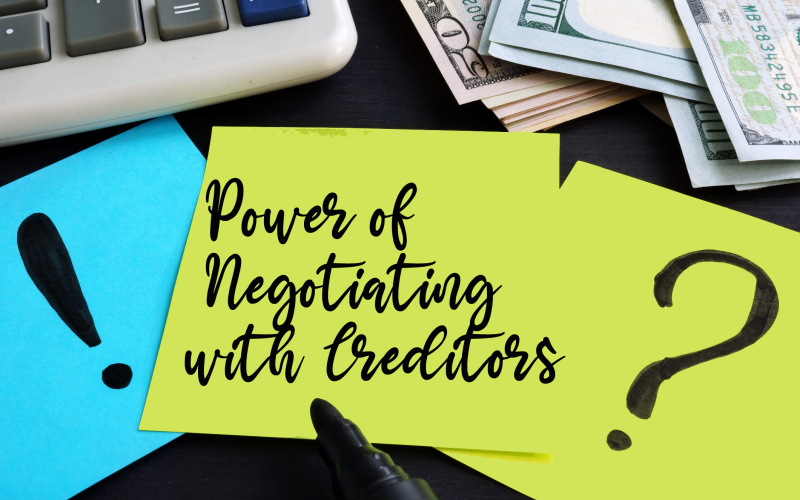Shares|ShareTweet “Show Me the Money!” – How Rural America is Luring City Slickers with Cold, Hard Cash Relocation Incentives Reshaping America’s Rural Landscape in the Face of Rising Costs Remember when your grandma used to slip you a $20 bill and tell you to buy something nice? Well, imagine if entire states and cities started doing that, but with way more zeros. That’s exactly what’s happening across rural America right now, and it’s causing quite a stir and relocation incentives are calling all that buzz with curious and adventure seekers. From the rolling hills of West Virginia to the wide-open…
The Power of Negotiating with Creditors: How It Can Help You Get Back on Track

Unlocking the Potential of Negotiating with Creditors
Dealing with mounting debts can be overwhelming and stressful. But what if you could negotiate with your creditors to ease your burden and get back on track financially? Negotiating with creditors can be a powerful tool that can help you reduce your payments, lower your interest rates, and waive fees. In this article, we’ll explore how negotiating with creditors works, when it’s appropriate, and its benefits.
Why negotiate with creditors?
Negotiating with creditors can have significant benefits for those struggling with debt. For example, you may be able to reduce your payments, lower your interest rates, and waive fees. Here are a few benefits of negotiating with creditors:
- Reduced payments: Negotiating with your creditors can help you reduce your payments, making it easier to manage your debt. For instance, if you owe $10,000, you may be able to negotiate a payment plan where you only pay $8,000 over time.
- Lower interest rates: High-interest rates can make it difficult to pay off your debts. Negotiating with your creditors can help you lower your interest rates, reducing the overall amount you owe. For example, if you owe $5,000 with a 20% interest rate, negotiating a lower rate can save you hundreds or even thousands of dollars in interest.
- Waived fees: Late fees and penalties can quickly add up and make it even harder to pay off your debts. By negotiating with your creditors, you may be able to waive these fees, reducing the amount you owe.
How to negotiate with creditors?
Negotiating with creditors may seem daunting, but it doesn’t have to be. Here are a few steps you can take to negotiate with your creditors:
- Contact your creditors: Reach out to your creditors and explain your situation. Be honest and transparent about your financial struggles and the reasons behind them.
- Propose a payment plan: Offer a payment plan that you can realistically afford. Explain how much you can pay each month and how long it will take to pay off your debts.
- Negotiate for better terms: Ask your creditors if they can reduce your payments, lower your interest rates, or waive fees. Be polite, but firm, and explain why you need these changes.
- Get the agreement in writing: Once you’ve negotiated a payment plan, make sure you get the agreement in writing. This will help you avoid any confusion or misunderstandings later on.
When to negotiate with creditors?
Negotiating with creditors is most effective when done early on. If you’re struggling to make payments, reach out to your creditors as soon as possible. Here are a few situations where negotiating with your creditors may be appropriate:
- Before missing payments: If you’re anticipating difficulty making your payments, reach out to your creditors before you miss a payment. This will show them that you’re proactive and willing to work with them to resolve the situation.
- After missing payments: If you’ve already missed payments, don’t wait to reach out to your creditors. The longer you wait, the harder it may be to negotiate with them.
FAQ
Q: Will negotiating with creditors hurt my credit score?
A: Negotiating with your creditors may have a temporary negative impact on your credit score. However, in the long run, it can improve your credit by helping you pay off your debts.
Q: Do I need a professional to negotiate with creditors?
A: No, you can negotiate with your creditors on your own. However, if you’re feeling overwhelmed or unsure of how to negotiate effectively, seeking the help of a professional can increase your chances of success.
Q: What if my creditors refuse to negotiate?
A: If your creditors refuse to negotiate, there are still other options available to you, such as seeking help from a credit counseling agency or exploring debt consolidation options.
Conclusion:
Negotiating with creditors can be a powerful tool for managing debt and getting back on track financially. By reducing your payments, lowering your interest rates, and waiving fees, negotiating with creditors can help you save money and reduce your stress. Remember, the key to successful negotiations is to be honest, transparent, and proactive. Don’t wait until you’re in too deep – reach out to your creditors early on and start negotiating today.
Disclaimer: The information provided in this article is for educational and informational purposes only and should not be construed as financial advice. It is important to consult with a financial professional before making any decisions regarding debt consolidation services or any other financial products or services. The author and publisher of this article are not liable for any damages or losses related to the use or reliance on the information provided herein. Words from the wise concerning of financial wisdom;
“The rich rule over the poor, and the borrower is slave to the lender.” – Proverbs 22:7
This quote from the Bible highlights the importance of managing debt and avoiding the cycle of borrowing and repayment. It emphasizes the power dynamics at play when one is indebted and the importance of taking control of one’s finances to avoid becoming a slave to debt.
The Benefits of Debt Consolidation Services for Simplifying and Reducing Debt
We hope you found “The Power of Negotiating with Creditors: How It Can Help You Get Back on Track” helpful for your pursuit to explore further your need for Debt Management.






Pingback: The Benefits of Debt Consolidation Services for Simplifying and Reducing Debt